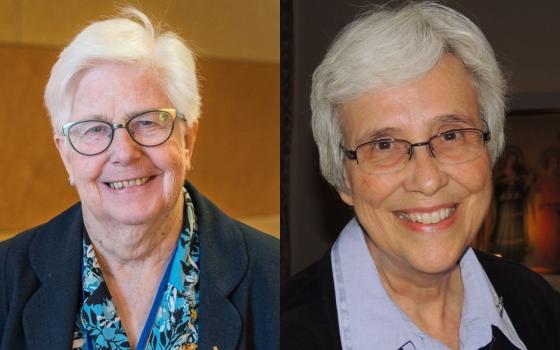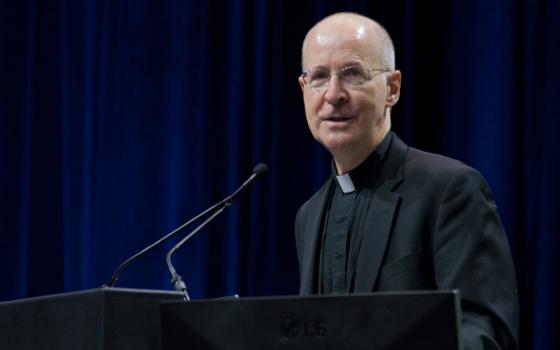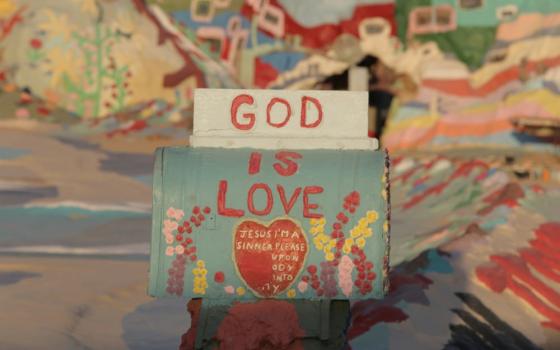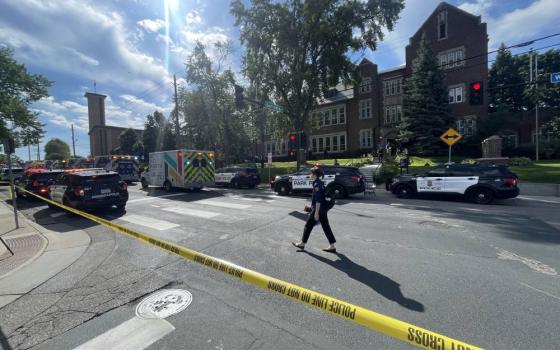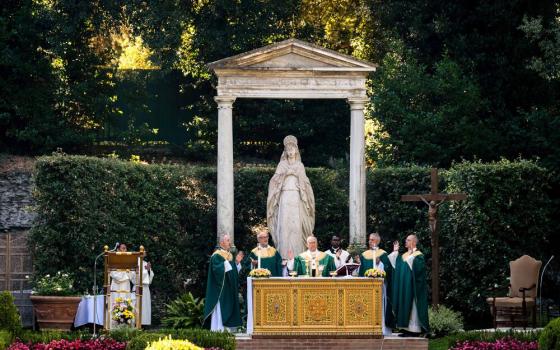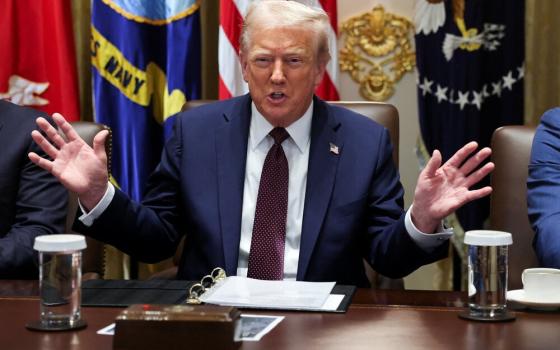Argentine President-elect Javier Milei's supporters celebrate in Buenos Aires Nov. 19, after Milei won Argentina's runoff presidential election. (OSV/Reuters/Mariana Nedelcu)
When Passionist Srs. Florencia Buruchaga and Angélica Agorta entered the voting booth for Argentina's runoff election, they confronted a choice between casting a blank ballot or voting for Javier Milei — the firebrand libertarian who derided Pope Francis as a "filthy leftist." Opting for the ruling Peronist coalition and its candidate, Sergio Massa, was never an option.
"We had doubts about Milei because he was extremely rude and seemed half crazy," Agorta said.
But both found reassurance in more mainstream politicians joining Milei's campaign and the candidate moderating his vituperative tone as the Nov. 19 runoff election neared. The thought of four more years of Peronist rule — influenced by its Kirchnerista faction, which has dominated Argentine politics for most of the past two decades — also seemed untenable.
'Like many, I also say today: enough of this hollow and deaf Peronism. Enough of this welfare state ... Enough of this populist banner that destroys dignity and thought.'
—Sr. Florencia Buruchaga
Argentina's President Javier Milei is sworn in as Argentina's president next to former president and the outgoing vice president, Cristina Fernandez de Kirchner, at the National Congress in Buenos Aires Dec. 10. (OSV/Reuters/Matias Baglietto)
"We didn't know whether to vote for him or not," Buruchaga said. "What we did know is that we didn't want Kirchnerismo," referring to the politics of former president Cristina Fernández de Kirchner and her predecessor and deceased husband, Néstor Kirchner. As the outgoing vice president, Kirchner has retained outsized political influence since her presidential term ended in 2015.
Milei at first blush may appear an unlikely option for a pair of Passionist nuns with a ministry of working with some of the country's poorest and least protected in Villa Hidalgo, one of the shantytowns dotting the vast suburbs of Buenos Aires — a longtime Peronist stronghold.
It's a place where men eke out livelihoods sifting through garbage for recyclables, women barely finish primary school (if at all), and problems such as drug addiction and teen pregnancy are rife. It's also a place where the Peronists win votes as the movement — especially the Kirchneristas — formed patronage groups among social assistance recipients, according to Buruchaga.
The Passionists have developed a program known as "Project Dignity" in Villa Hidalgo, accompanying women who are often abused and abandoned and often lacking the skills to succeed in society.
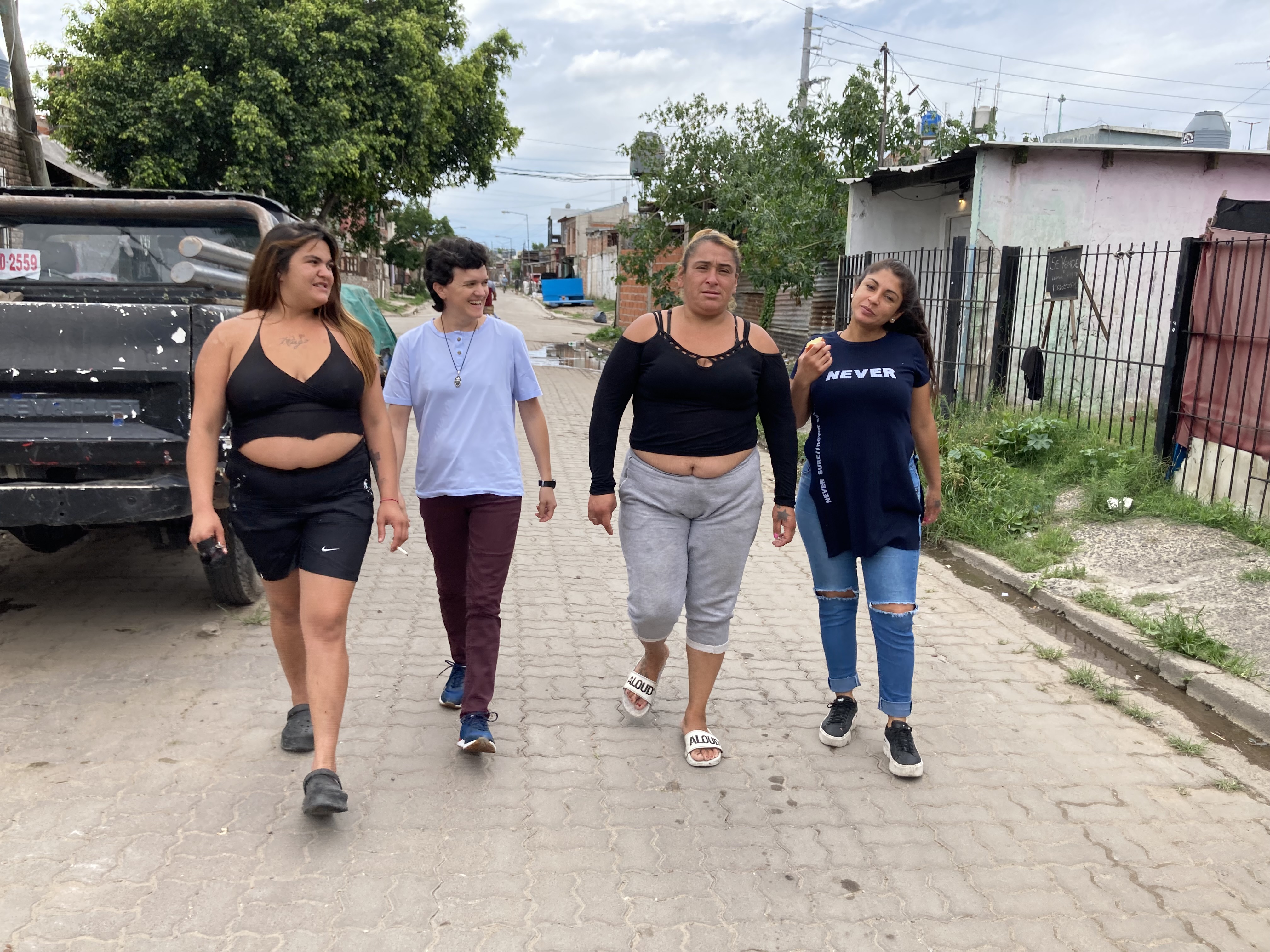
Passionist Sr. Florencia Buruchaga walks with three residents through the Villa Hidalgo shantytown Dec. 4. Buruchaga accompanies the women in a program for promoting dignity in an impoverished community rife with difficulties such as drug addiction, teen pregnancy and poverty. (David Agren)
Buruchaga sees little dignity in the relationship between the women in her project and the state — especially come election time — even as the Peronists speak of "social justice." That includes universal access to free education and health care, along with social welfare benefits and subsidies for basics such as electricity and public transportation.
"Our poor are hostages of the state," Buruchaga said in a public letter published before the election.
On a trip into Villa Hidalgo, she pointed to freshly poured pavement and attempts at sprucing up a barrio of tin shacks often built by residents who originally arrived as squatters from other parts of Argentina or neighboring Paraguay. The pavement was only poured before the elections — a common occurrence, she said, as politicians see the residents as voters rather than citizens.
"These people don't exist for them. … [Politicians] don't look for them to enroll them in school. They only exist when it's time to vote," Buruchaga said.
"They don't install water (for residents) until they know how they're going to vote," she said as she continued driving. "This was the Massa campaign; it was a fear campaign."
The Passionist sisters' tortured votes captured the conundrum for many Argentines — especially Catholics working with the poor — who found Milei's austerity policies and personal eccentricities difficult to reconcile. They considered his attacks on the pope (a fellow Argentine) gratuitous and offensive, too.
But they, like many in this country of more than 45 million people, also tired of the country's recurring economic crises and the political class' excesses.
An economist, TV commentator and self-described anarcho-capitalist with a messy mop of hair, thick sideburns and an explosive speaking style, Milei campaigned on a platform of slashing government: limiting spending to all but health, education and social services.
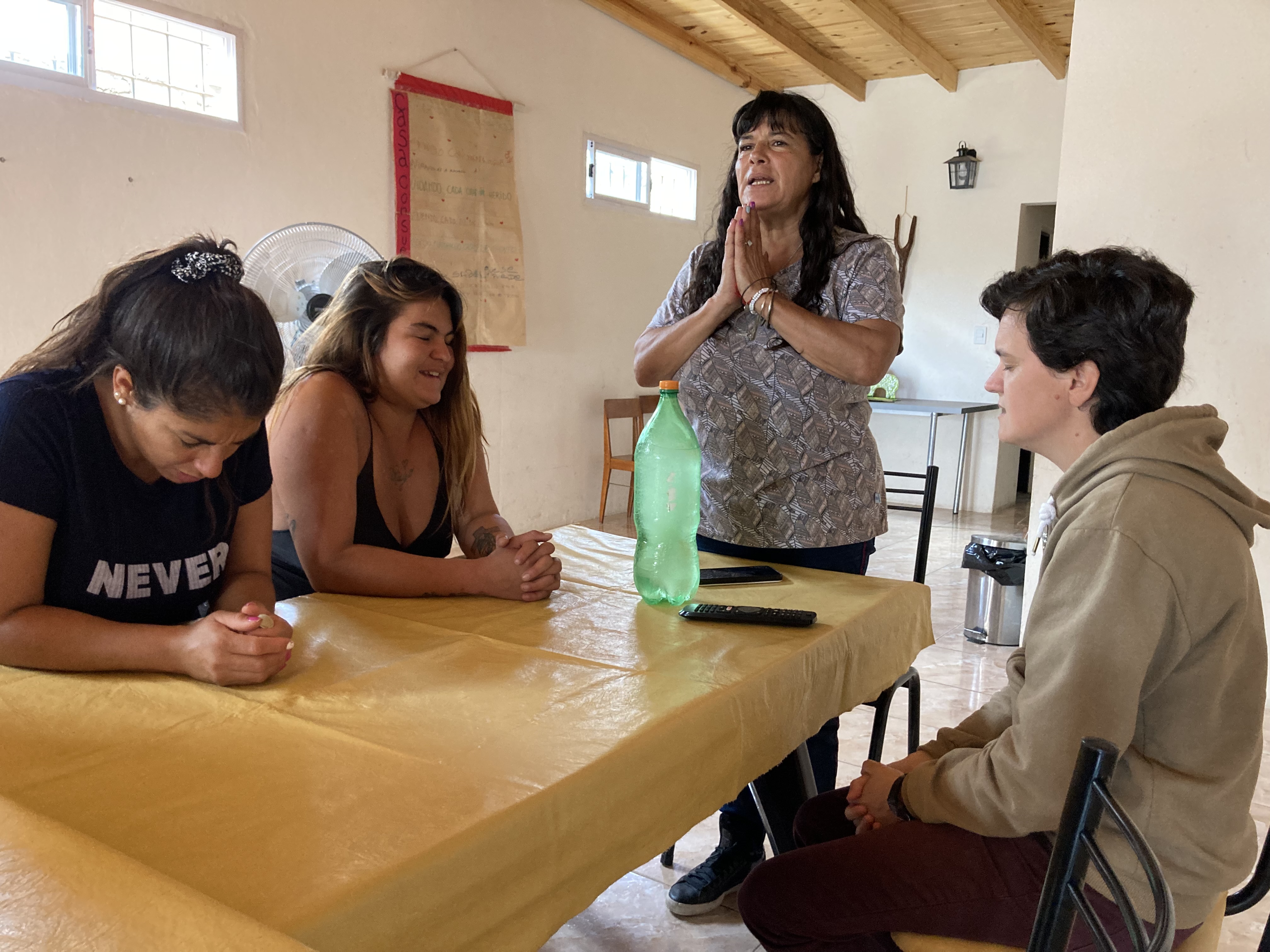
Viviana Hernández says grace before lunch Dec. 4 at a Passionist project for women in suburban Buenos Aires. The project accompanies women living in a shantytown where Hernández, a community organizer, said politicians only pay attention to pressing issues before elections. (David Agren)
Still, the message appealed to Argentines anxious over falling living standards, with salaries eroded by inflation topping 160% and poverty reaching 45% in a country where much of the population views itself as middle class.
Milei promised to swap the sagging Argentine peso for the U.S. dollar, close the central bank and chasten the country's political class, which he called, "the political caste." He also supported radical measures such as loosening gun laws and allowing the sale of human organs, but backed off the measures (and slowed his push to dollarize) in an attempt at moderating his style and substance leading up to the Nov. 19 runoff election.
The vote for Milei also expressed the anger of many Argentines — including Buruchaga. Allegations of graft had been leveled against the Peronists, especially the Kirchnerista faction.
'We didn't know whether to vote for him or not. What we did know is that we didn't want Kirchnerismo.'
—Sr. Florencia Buruchaga
Buruchaga voiced her frustrations in a three-page letter to fellow religious made public before the election, in which she spoke with sorrow of the state of the country. She also insisted Argentina's problems were political rather than purely economic, with politicians leveraging poverty for electoral purposes, while living lavishly themselves.
"There's a disgust with political figures and the inability to propose constructive and honest paths," Buruchaga wrote.
"Like many, I also say today: enough of this hollow and deaf Peronism. Enough of this welfare state that does not care about people's rights. Enough of the cynicism of those in positions of power. Enough of politicians who don't know when to retire. Enough of this populist, national and popular banner that destroys dignity and thought. Enough of unprepared officials with purchased credentials. Enough of 'a few and not all,'" she continued.
"There is a fatigue in society and it was noticeable at the polls in the primary elections. Milei's appearance is also the result of that societal stress."
Milei swore the oath of office in Congress Dec. 10, then broke with protocol to address throngs of supporters waving Argentine flags in the plaza outside. He offered a somber economic assessment, then reiterated his promise of tough measures in a country accustomed to profligate spending, rising inflation and currency devaluations.
"There's no money," he said at his inauguration. "There is no alternative to austerity and shock (measures). It will have a negative impact on activity, employment, the number of poor and extreme poor. There will be stagflation, but that will not be very different from the last 12 years."
"These people (of Villa Hidalgo) don't exist for them. … (Politicians) don't look for them to enroll them in school. They only exist when it's time to vote.
—Sr. Florencia Buruchaga
Milei's government wasted little time in announcing tough measures, including a currency devaluation of more than 50% and the shrinking of government ministries from 18 to nine. Economy Minister Luis Caputo said social spending would remain intact, though
"If we carry on as we are, we will have hyperinflation," Caputo told Argentines Dec. 12, according to the Financial Times.
Catholics working with the poor have expressed alarm with Milei's plans, arguing it would impact the neediest.
"The president says that he's not going to cut" social spending, said Fr. Roberto Ferrari, a priest in suburban Buenos Aires, who is part of the group Priests for the Option for the Poor. "The assistance for the neediest people, the subsidies, the income supports that are given, however, there's a big chance that if there are (price) increases, (the poor} are going to be the first to suffer."
Buruchaga expressed a more sanguine view, pointing to a bloated bureaucracy, which has grown by 34% between 2011 and 2022 — compared to just 3% for private employment — according to the IERAL think tank.
Advertisement
Much of the Catholic hierarchy remained mum on Milei's rise — even with the candidate disparaging Pope Francis, who was previously archbishop of Buenos Aires. The Argentine bishops' conference declined to comment on the election and issued a brief, 59-word statement after Milei won the runoff.
Pope Francis, however, called Milei shortly after the election to offer congratulations. Milei reportedly called the pope, "Your holiness," and invited him to visit Argentina. The pope, in comments to Televisa Dec. 12, said his travel schedule would be reduced in 2024, though he didn't rule out a trip to his birth country — which he hasn't visited since being elected in 2013.
He also referred to Milei's discourtesies, saying, "In an election campaign, things are said 'in jest' — they are said seriously, but they are provisional things, things that are used to create a bit of attention, but which later fall away by themselves."
Church observers say the Argentine church's message was sent via the pope's phone call to Milei. "The call (to Milei) was the message," said Fabián Calle, political science professor at the Pontifical Catholic University Argentina. "The role of the church is to help, not fight Milei."
Some priests with open Peronist and Kirchnerista sympathies campaigned against Milei, according to church observers, with one priest even telling Milei voters to stay away from a parish soup kitchen.
A group of priests, known as the curas villeros, who work in the shantytowns celebrated a Mass of reparation in September after Milei maligned the pope. It was an unpopular exercise for many in the church, according to observers, while also showing the pope and church's limited influence in Argentine politics.
"It had no impact in society, no importance for many people," said José María Poirier, publisher of the Catholic magazine Criterio.
"Nobody cares what the church says. The church ended up very poorly positioned because it had this discourse of the pueblo [people], the poor, etc., which became distorted in the election."
For her part, Buruchaga described the Mass as "political," with the message, "Don't vote Milei."
While the church may wield little influence in Argentine public life and society at large, it remains somewhat influential in social matters such as poverty, according to church observers.
Priests and religious in poor barrios operate soup kitchens, drug rehabilitation programs and vocational training schools, among other projects. Some involve government cooperation — such as an agency for drug addictions providing funding for employee salaries.
"We work with the state. But we don't let them domesticate us," Buruchaga said, taking an independent stance from others in the church.
"We're doing a job that the state should be doing. It should be supporting it," she adds, though with Milei's austerity, that support remains to be seen.
This story was originally published in Spanish on Dec. 18, 2023.


